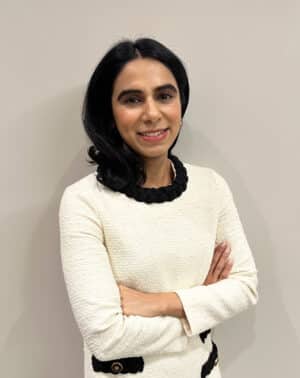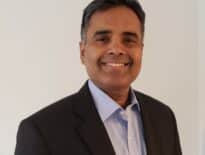Rafia Zahir-Uddin
Vice President of Corporate Responsibility, JPMorgan Chase
Age: 35
Industry experience: 14 years
Coming from the world of government administration, Rafia Zahir-Uddin has helped JPMorgan Chase organize significant community investments in Massachusetts as its vice president for corporate responsibility. She takes a hands-on approach in going to the communities and speaking to local nonprofits and organizations to establish local roots amid Chase’s expansion nationwide, including Connecticut.
She started her career in healthcare and public policy with AIDS United for almost three years, then went to complete her masters degree in public administration at Cornell University. Prior to joining Chase and being involved in bank philanthropy, Zahir-Uddin moved to New York City from Washington D.C. and served the city’s Department of Small Business Services as director of its workforce development division, assisting training and workforce development during the pandemic.
Q: How would you describe the needs of communities in Massachusetts? How big is the need, and how do you, as part of Chase, reach out to these key Mass. communities?
A: At JPMorgan Chase, we take great pride in being proximate to the communities we serve.
While Massachusetts is a cultural and economic hub, the communities across the state have unique characteristics. Boston may be an urban epicenter, but the state also has 26 Gateway Cities that all have different socio-economic challenges.
A theme we’ve heard across the state is that there are significant wealth disparities for Black, Latino(a), and households of color affected by high costs of housing, owning and operating a small business, and access to quality employment opportunities that offer competitive wages.
We leverage our relationships to bring together civic, public and business leaders to help inform key challenges and opportunities for engagement through roundtable discussions, site visits with community-based and anchor organizations and taking time to listen and learn from local residents on where the firm can make a meaningful impact.
Lastly, we host convenings for diverse stakeholders including public officials, nonprofits and funders to share research, insights and opportunities for partnership that address key economic development challenges related to neighborhood development, small business, workforce and financial health.
Our Chase Community Center [branch] in Mattapan has been a tremendous resource in Greater Boston for hosting community events. Further, the Mattapan Community Center is utilized to provide local residents financial health workshops, skills training and a storefront for small business pop-ups.
Q: Which organizations do you partner with in Massachusetts, how do you partner with them and how big are Chase’s charitable investments in the state?
A: A few highlights of our work in Massachusetts include $430,000 to Just a Start Corp. [in Cambridge] to scale the organization’s Career Connect program that provides job skills training for careers in life sciences. Our support will also enable the organization to pilot a new program providing job training in animal care life science research and also develop a fee-for-service revenue generating model for the organization’s workforce development programs.
We also gave $275,000 to Resilient Coders’ Boston boot camp, a software engineering and coding program for low-income Bostonians that creates pathways to economic mobility through technology training and employment.
And we gave $750,000 to Dorchester Bay Economic Development Corp. to support business coaching, access to capital and commercial space subsidies for businesses owned by people of color.
Q: If in Connecticut, you are concerned with improving small business and jobs & skills support, what are the key areas in Massachusetts where Chase concentrates its giving?
A: Our strategy in Massachusetts is to advance economic mobility for low-income communities. To that end, we support: career pathway investments that align supply and demand with industry validated training in high-growth and emerging sectors; small business development ecosystems to scale and expand services and access to capital tailored for minority-owned businesses; and access to affordable housing options is an issue that has come up across the state and it as emerging issue area that we have identified for future funding opportunities.
Q: With Chase going big with its Massachusetts branch expansion, how do you and the corporate responsibility team go about catching up and connecting with local communities?
A: As we expand, we look to see how we can support the communities where we operate. We hire locally, we hire local vendors to help build or refurbish our branches, our branch teams volunteer and our philanthropy and community engagement teams identify nonprofit organizations that may be aligned to our funding strategy for potential engagement and investments.
Q: How would you compare the bank’s ability to provide for local communities in your areas of expansion versus the community banks that have local connections and philanthropic programs in their DNA?
A: I cannot speak for other community banks, but I will say that while we are a global bank, we really focus on partnerships or relationships with trusted local organizations and serve local communities. The corporate responsibility team, we like to meet with partners regularly, going to events, volunteering, understanding the local context and becoming a part of the local community. Building those relationships is something that we really pride ourselves on. We might be a global firm, but everything that we do is in the context of our local community is local.
Also, I think what is unique to JPMorgan Chase is that we look at our grants as ‘risk capital’ to test, innovate and scale promising solutions. I think that is a form of strategic philanthropy. Grant capital is just one aspect of corporate responsibility. We also have so much business expertise where we can bring in additional resources, technical expertise, information, or relationships that maybe a family foundation wouldn’t be able to do. An example is to bring my own experience in internal hiring practices to these organizations [through volunteerism] and help them to improve their recruiting process, and identify where do we need to develop relationships.
Zahir-Uddin’s Favorite Hobbies
- Running marathons
- Listening to podcasts, like “The Daily” by the New York Times
- Trying different dessert places
- Hiking in national parks
- Reading “The Alchemist” by Paulo Coelho twice a year




 |
| 

